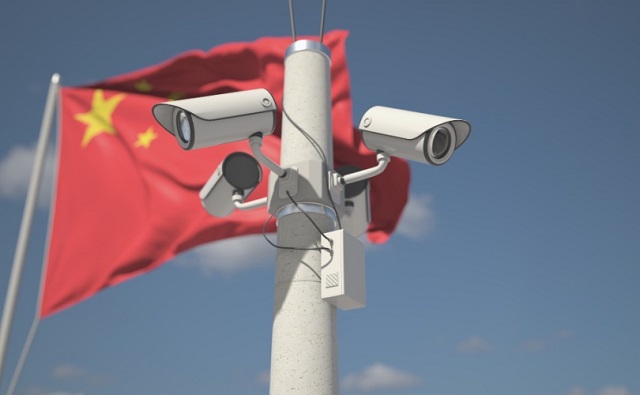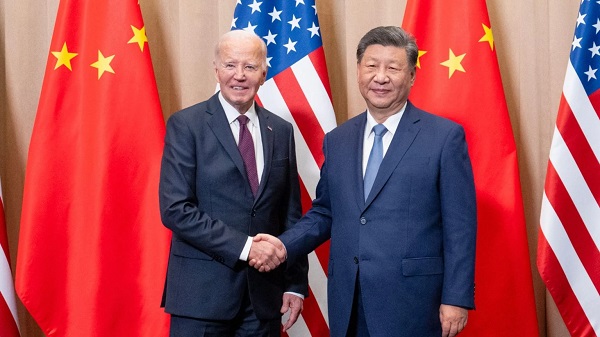Censorship Industrial Complex
Chinese firms show off latest police-state surveillance tech at security expo

From LifeSiteNews
By Angeline Tan
45 Chinese firms have showcased their latest police-state products and technologies, with one expert warning that the communist nation is doing so to normalize their method of surveillance and have it adopted abroad.
45 Chinese firms have showcased their latest police-state products and technologies, including state-of-the-art CCTV, precise DNA-testing technology and intrusive facial tracking software, at the inaugural Public Security Tech Expo in Lianyungang, located in China’s Jiangsu province.
Hosted by China’s First Research Institute of the Ministry of Public Security, the 6-day tech expo which began on September 7 showed off advanced technologies in the domains of “criminal technology, police protective equipment, traffic management equipment, anti-terrorism rescue, and command and communication,” according to the forum’s website.
The website’s official description says “the main purpose of holding the Public Security Tech Expo (Lianyungang) under the framework of the Forum is to deepen technical exchanges and international cooperation in the field of public security science and technology equipment, share useful experience in the application of science and technology equipment to public security practice, and jointly improve the ability and level of maintaining public security.”
One firm participating in the expo, Caltta Technologies, featured a project aimed at “helping” the southern African nation of Mozambique establish an “Incident Response Platform,” extolling its abilities to harness data in “rapid target location.”
Tech giant Huawei was also at the expo, boasting that its “Public Safety Solution” is currently used in more than 100 countries and regions, from Kenya to Saudi Arabia. The United States sanctioned Huawei in 2019, castigating the firm as “an arm” of the Chinese surveillance state.
The expo also saw China’s Ministry of Public Security’s Institute of Forensic Science show off its new high-tech DNA testing technologies. In 2020, Washington banned the institute from accessing some U.S. technology after a number of Chinese firms decried the institute as being “complicit in human rights violations and abuses.”
In 2018, the U.S. Treasury stated that residents of Xinjiang “were required to download a desktop version” of the app “so authorities could monitor for illicit activity.”
Communist China has been slammed for jailing over one million Uyghurs and other Muslim minorities in Xinjiang – claims Beijing vehemently denies. Nonetheless, critics have pointed out how China’s surveillance technologies have been used to draconically suppress dissidents in the Xinjiang province.
During the expo’s opening ceremony, China’s police minister praised Beijing for training thousands of overseas police officers this past year – and pledged to aid in the training of thousands more over the coming year.
Reacting to these disturbing developments, especially China’s activity abroad, Bethany Allen at the Australian Strategic Policy Institute said, “Beijing is hoping to normalize and legitimize its policing style and… the authoritarian political system in which it operates.”
According to UCA News, “China is one of the most surveilled societies on Earth, with millions of CCTV cameras scattered across cities and facial recognition technology widely used in everything from day-to-day law enforcement to political repression.”
The same UCA News article added:
Its police serve a dual purpose: keeping the peace and cracking down on petty crime while also ensuring challenges to the ruling Communist Party are swiftly stamped out.
Notably, various foreign police officers said they hoped to use Chinese surveillance technology to police their own countries.
“We can learn from China,” said Sydney Gabela, a major general in the South African police service, according to UCA News.
“We wanted to check out the new technologies that are coming out so that we can deploy them in South Africa,” Gabela said.
China’s notoriety for being a highly-surveilled state goes back a long way. In 2023, The Economist ran an article detailing how the prevalence of CCTV cameras in Communist China, many bedecked with facial-recognition technology, “leave criminals with nowhere to hide.” A September 2019 report by the U.S. Commission on International Religious Freedom (USCIRF) also disclosed that “the Chinese government has increasingly employed advanced technology to amplify its repression of religious and faith communities.”
The executive summary of the same USCIRF report stated:
Authorities have installed surveillance cameras both outside and inside houses of worship to monitor and identify attendees. The government has deployed facial recognition systems that are purportedly able to distinguish Uighurs and Tibetans from other ethnic groups. Chinese authorities have also collected biometric information—including blood samples, voice recordings, and fingerprints—from religious and faith communities, often without their consent. The government uses advanced computing platforms and artificial intelligence to collate and recognize patterns in the data on religious and faith communities. Chinese technology companies have aided the government’s crackdown on religion and belief by supplying advanced hardware and computing systems to government agencies.
Censorship Industrial Complex
G20’s Online Speech Clampdown Calls Set To Ignite Free Speech Fears

G20 leaders convened in Rio de Janeiro have called for enhanced responsibility and transparency from digital platforms to tackle the growing challenges of “misinformation,” “disinformation,” “hate speech,” and others on their long list of supposed online “harms.”
The summit’s final declaration highlighted the transformative role of digital platforms in global communication but noted the adverse effects of digital content’s rapid spread. It called for increased accountability from platforms to manage speech, which should raise eyebrows among free speech advocates who’ve heard all this before.
We obtained a copy of the declaration for you here.
During the summit, the leaders highlighted the transformative impact of digital platforms in communication and information dissemination across the globe. However, they also alleged negative ramifications of unchecked digital spaces, where “harmful” content can proliferate at an unprecedented pace and scale.
In response, the G20’s final declaration underscored the critical role of digital platforms in ensuring their ecosystems do not become breeding grounds for speech they don’t like.
The declaration states: “We recognize that digital platforms have reshaped the digital ecosystem and online interactions by amplifying information dissemination and facilitating communication within and across geographical boundaries. However, the digitization of the information realm and the accelerated evolution of new technologies, such as artificial intelligence (AI), has dramatically impacted the speed, scale, and reach of misinformation and disinformation, hate speech, and other forms of online harms.”
The G20 goes on to say that it emphasizes the “need for digital platforms’ transparency and responsibility in line with relevant policies and applicable legal frameworks and will work with platforms and relevant stakeholders in this regard.”
The declaration even says more measures need to be taken to control what it says is the spread of online misogyny and the need to combat it “online and offline.”
Censorship Industrial Complex
Tucker Carlson: Longtime source says porn sites controlled by intelligence agencies for blackmail

From LifeSiteNews
Journalist Glenn Greenwald replied with a story about how U.S. Speaker of the House of Representatives Mike Johnson changed his tune on a dime about the Foreign Intelligence Surveillance Act (FISA), which allows the government to spy on American communications without a warrant. The journalist made the caveat that he is not assuming blackmail was responsible for Johnson’s behavior.
Tucker Carlson shared during an interview released Wednesday that a “longtime intel official” told him that intelligence agencies control the “big pornography sites” for blackmail purposes.
Carlson added that he thinks dating websites are controlled as well, presumably referring at least to casual “hook-up” sites like Tinder, where conversations are often explicitly sexual.
“Once you realize that, once you realize that the most embarrassing details of your personal life are known by people who want to control you, then you’re controlled,” Carlson said.
He went on to suggest that this type of blackmail may explain some of the strange, inconsistent behavior of well-known figures, “particularly” members of Congress.
“We all imagine that it’s just donors” influencing their behavior, Carlson said. “I think it’s more than donors. I’ve seen politicians turn down donors before.”
Journalist Glenn Greenwald replied with a story about how U.S. Speaker of the House of Representatives Mike Johnson changed his tune on a dime about the Foreign Intelligence Surveillance Act (FISA), which allows the government to spy on American communications without a warrant. The journalist made the caveat that he is not assuming blackmail was responsible for Johnson’s behavior.
Greenwald told how he had seen Johnson grill FBI Director Christopher Wray about his agency’s spying and “could just tell that he felt passionately about (this),” prompting Greenwald to invite Johnson on his show, before anyone had any idea he might become Speaker of the House.
“One of the things we spent the most time on was (the need for) FISA reform,” Greenwald told Carlson, noting that the expiration of the current iteration of the FISA law was soon approaching. He added that Johnson was “determined” to help reform FISA and that it was in fact “his big issue,” the very reason he was on Greenwald’s show to begin with.
Johnson said regarding FISA, “We cannot allow this to be renewed; it’s a great threat to American democracy; at the very least, we need massive, fundamental reform” according to Greenwald.
Johnson became House Speaker about two months to three months later, and Greenwald was excited about the FISA reform he thought Johnson would surely help bring about.
“Not only did Mike Johnson say, ‘I’m going to allow the FISA renewal to come to the floor with no reforms.’ He himself said, ‘It is urgent that we renew FISA without reforms. This is a crucial tool for our intelligence agencies,’” Greenwald reounted.
He noted that Johnson was already getting access to classified information while in Congress, wondering at Johnson’s explanation for his behavior at the time, which was that he was made aware of highly classified information that illuminated the importance of renewing FISA and the spying capabilities it grants, as is.
Greenwald doesn’t believe one meeting is enough to change the mind of someone who is as invested in a position as Johnson was on FISA reform.
“I can see someone really dumb being affected by that … he’s a very smart guy. I don’t believe he changed his mind. So the question is, why did he?” Greenwald asked.
“I don’t know. I really don’t. But I know that the person that was on my show two months ago no longer exists.”
Theoretically, there are many ways an intelligence agency could coerce a politician or other person of influence into certain behaviors, including personal threats, threats to family, and committing outright acts of aggression against a person.
A former CIA agent has testified during an interview with Candace Owens that his former employer used the latter tactic against him and his family, indirectly through chemicals that made them sick, when he blew the whistle on certain unethical actions the CIA had committed.
“This is why you never hear about CIA whistleblowers. They have a perfected system of career destruction if you talk about anything you see that is criminal or illegal,” former CIA officer Kevin Shipp said.
As a form of coercion, sexual blackmail in particular is nothing new, although porn sites make the possibility much easier. In her book “One Nation Under Blackmail: The Sordid Union Between Intelligence and Crime That Gave Rise to Jeffrey Epstein,” investigative journalist Whitney Webb discusses not only how the intelligence community uses sexual blackmail through people like Jeffrey Epstein but how it was used by organized crime before U.S. intelligence even existed.
-

 Brownstone Institute2 hours ago
Brownstone Institute2 hours agoThe Most Devastating Report So Far
-

 Economy14 hours ago
Economy14 hours agoCOP 29 leaders demand over a $1 trillion a year in climate reparations from ‘wealthy’ nations. They don’t deserve a nickel.
-

 Alberta12 hours ago
Alberta12 hours agoOn gender, Alberta is following the science
-

 Energy13 hours ago
Energy13 hours agoOttawa’s proposed emission cap lacks any solid scientific or economic rationale
-

 Bruce Dowbiggin1 hour ago
Bruce Dowbiggin1 hour agoCHL Vs NCAA: Finally Some Sanity For Hockey Families
-

 Brownstone Institute1 day ago
Brownstone Institute1 day agoFirst Amendment Blues
-

 Crime2 days ago
Crime2 days agoMexican cartels are a direct threat to Canada’s public safety, and the future of North American trade
-

 Business2 days ago
Business2 days agoDEI gone?: GOP lawmakers prep to clean house in federal government




